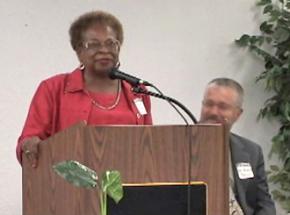A question of discrimination
reports on a proposed ballot measure that would ban affirmative action programs in Oklahoma--and the attempts to build an opposition.
"IT'S HARD to start a race when you start behind." That how Marilyn Luper-Hildreth, a civil rights activist and daughter of Clara Luper, who led lunch counter sit-ins in Oklahoma City in 1958, summed up the theme of a public forum on the anti-affirmative action State Question (SQ) 759.
The measure--a proposed amendment to the state constitution that seeks to eliminate affirmative action programs in the state and prohibit "preferred treatment based on race, color or gender"--is up for a vote on Oklahoma's November 6 ballot.
The September 20 meeting, hosted by the Oklahoma City Peace House and the Oklahoma City chapter of the NAACP, brought out about 80 people and featured a panel of six professors, activists and church leaders representing African American, Native American, Latino and women's groups.
In addition to Luper-Hildreth, Rev. Dr. Lawrence Ware, a professor of philosophy at Oklahoma State University, spoke fiercely about the issue of racism in the U.S.
"They [the authors of the bill] assume that race is no longer a problem in society," said Ware. "One out of every two Black children is born in poverty. Thirteen percent of the U.S. population is Black, but they make up 40 percent of the prison population. There is still injustice in America!"

Most of the information that the authors of the bill, Republican state Reps. Leslie Osborn and Rob Johnson, cite is false and driven by the notion that race simply is not an issue in America.
"I think we should judge people purely on their qualifications," Johnson said last year about the proposed ban. "I think at one point in time, there was a need for affirmative action programs, like right after the civil rights movement, but I think the time has come now where they are doing more damage than good."
Republican Rep. Sally Kern had this to say about African American students:
We have a high percentage of Blacks in prison and that's tragic. But are they in prison because they're Black or because they don't want to study as hard in school? I've taught school and I've seen a lot of people of color who didn't study hard because they said the government would take care of them.
SUPPORTERS OF the legislation claim that affirmative action programs encourage "reverse discrimination" and divisions between groups of people. However, considering the disproportionate number of white students in attendance at state universities versus those affected by the programs, these claims simply don't hold water.
Statements like Kern's illustrate the primary philosophy behind SQ 759. They assume that not only is race no longer a problem in the U.S., but that African Americans, Latinos, Asian Americans, Native Americans and women are largely "undeserving" of an equal playing field.
SQ 759 seeks to destroy any of the fundamental assistance that helped so many people--not to get ahead, but to get a chance.
Proponents of the bill say that businesses and government agencies could keep affirmative action laws in place if they so choose--but that would, of course, cost money. As it stands now, the affirmative action measures that these entities have in place are cosmetic and not enforced.
SQ 759 would take things a step further. It would also eliminate any assistance from the state government in the form of contracts to businesses that primarily hire or are run by a minority group. This means that these companies would find it more difficult and more costly to stay in business and hire new employees that would include white job candidates.
For women, passage of SQ 759 could mean little punishment for sexual harassment on the job.
For an argument about why Oklahoma needs affirmative action programs, just look at the statistics. In Oklahoma, which imprisons more women than any other state in the nation, women still make less than 77 cents to every dollar a man makes. And African American, Latino and Native American communities still experience far greater instances of poverty compared with most white communities in the state.
Affirmative action opponents seldom mention that one of the groups that current affirmative action programs help is disabled veterans. Passage of SQ 759 could eliminate extra consideration for disabled veterans, especially women or minorities, seeking jobs or education. In other words, the people right-wingers in almost every state are quick to offer their support would be left out in the cold if this amendment passes on November 6.
Many activists at the public forum said that putting SQ 759 on the ballot in November was aimed at encouraging high, conservative turnout on Election Day. The language that will appear on the ballot specifically targets white voters who harbor misinformed or under-informed views on affirmative action.
Information about SQ 759 has been kept quiet--which some activists believe is a possible tactical maneuver learned by the right wing after a widely publicized anti-abortion "personhood" bill was defeated last March. Even government officials are unaware of the bill's existence or its goal.
But activists like Luper-Hildreth and others vow to tell their friends and neighbors about the bill and to talk about it as much as possible. "We've come too far to turn back now," said Luper-Hildreth. "We're tired of being discriminated against!"


